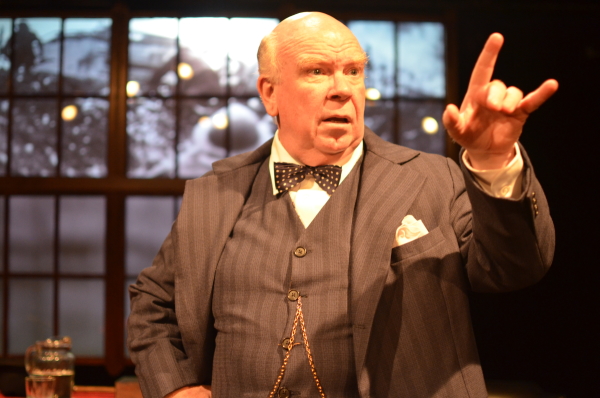Churchill

(© Jason Epperson)
The prime minister of the United Kingdom during World War II, Winston Churchill, looms large as a great figure of the 20th century. Like his historical counterparts (Franklin Roosevelt, Hitler, Stalin), we tend to think of him in mythical terms. He's more a statue with engraved quotations than a man. Writer-performer Ronald Keaton attempts to humanize "The Last Lion" with his solo play, Churchill, now making its New York debut at New World Stages. He only partly succeeds. While we get a sense of Churchill's private life and prodigious wit, by the show's end he still remains on his pedestal.
The play takes a form similar to Holland Taylor's Ann, with Churchill occupying a handsomely furnished wood-paneled office (set by Jason Epperson) from which he speaks directly to us. He recounts his life, from his birth at Blenheim Palace to his famous "Iron Curtain" speech at Westminster College, Missouri. Along the way we learn about his education at Sandhurst, his entrance into politics, and his ascendance to the office of prime minister to lead the wartime government. Throughout, he remains the consummate politician, subtly charming us with his jovial wit.
Like any good politician or actor, this Churchill knows his audience. He emphasizes his everlasting affection for the United States (his mother was American) and its people, with special reverence to FDR. He makes sure to mention his early support for a Jewish homeland. For those he can't win over with excessive praise, he offers a wealth of witty zingers, including his response to Lady Astor's assertion that if she were his wife she'd put poison in his coffee: "Nancy, if I were your husband, I would drink it." He reserves some choice words for his Labourite successor, Clement Attlee, whom he describes as, "a modest man with much to be modest about." Most of these sayings are well-known, as are his more famous addresses, of which we also get a sampling.
Director Kurt Johns activates this avalanche of words with the help of projection designer Paul Deziel, who illustrates the text with multiple video screens disguised as window panes in the upstage wall. Occasionally, Eric Backus underscores a moment with his subtly effective sound design. Unfortunately, Keaton wears a somewhat rumpled three-piece suit that could have come from a bag at Halloween Adventure, betraying the lack of a costume designer.
Keaton doesn't look much like Churchill, but he has an uncanny hold on his speech patterns, particularly the Churchillian tendency to accent the last few syllables of a sentence. While not a perfect imitation, Keaton's version of Churchill is easy enough to accept when paired with the man's real words. Once the Scotch begins to flow, he really hits his stride and a somewhat timid uncle transforms into the life of the party.
Still, the tone of the play never moves beyond that of a festive gathering of friends. We don't hear much from Churchill about his stubborn defense of British imperialism, or that policy's implications as the empire diverted resources to the war effort. India (which suffered a terrible famine in 1943 and struggled for independence throughout Churchill's administration) is only mentioned in the context of droll anecdotes about Churchill's formative years; Gandhi is not mentioned at all. The play cheerfully ignores these darker aspects of the British Bulldog. The result is a charming tribute to the great wartime leader, but not a very compelling bio-drama. We see Churchill wrangle with Hitler, but never with himself.
Perhaps this is a flaw inherent in the form: Keaton spends nearly two hours as Churchill, giving us Churchill's version of events. Memoir is a notoriously self-serving genre. (A note in the program informs us that the play is presented with the support and permission of the Churchill Centre, an international organization dedicating to preserving his legacy.) With that in mind, Churchill is akin to estate-approved jukebox musicals like A Night With Janis Joplin. You get to hear Churchill's greatest hits performed by a talented actor doing a decent impersonation. If that is all you're looking for, this is the show for you. Just don't expect to walk away with any new insights on this venerated historical figure.










